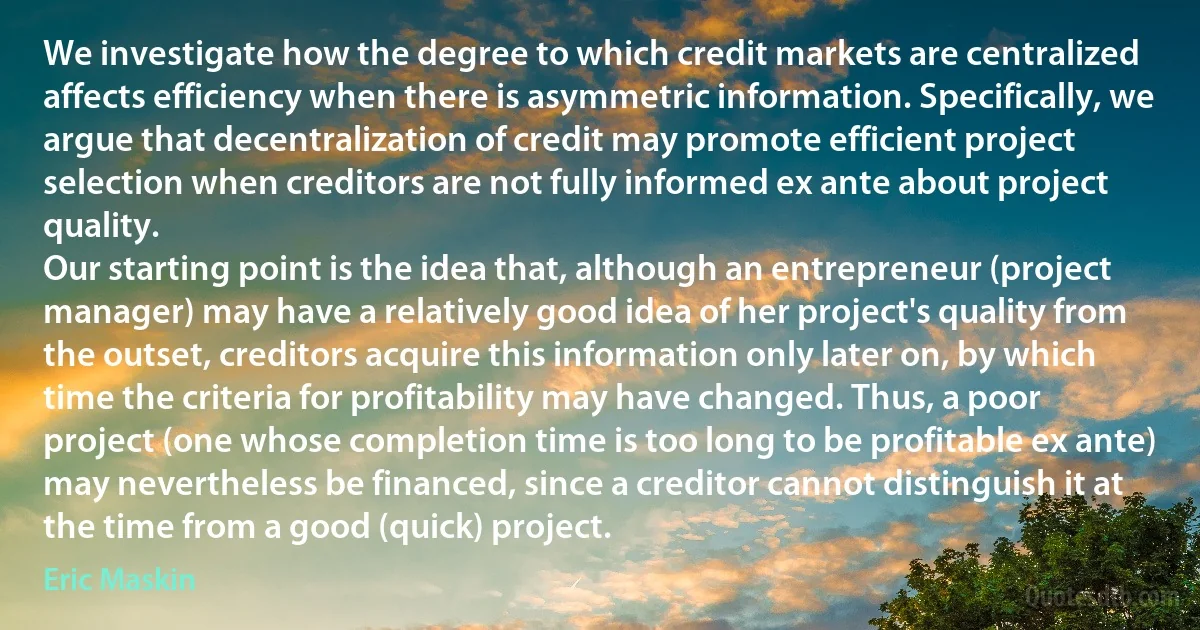
We investigate how the degree to which credit markets are centralized affects efficiency when there is asymmetric information. Specifically, we argue that decentralization of credit may promote efficient project selection when creditors are not fully informed ex ante about project quality. Our starting point is the idea that, although an entrepreneur (project manager) may have a relatively good idea of her project's quality from the outset, creditors acquire this information only later on, by which time the criteria for profitability may have changed. Thus, a poor project (one whose completion time is too long to be profitable ex ante) may nevertheless be financed, since a creditor cannot distinguish it at the time from a good (quick) project.
Eric MaskinRelated topics
completion credit criterion decentralization degree entrepreneur good idea later outset point poor project quality quick selection thus time profitabilityRelated quotes
How could such industries as software, semiconductors, and computers have been so innovative despite historically weak patent protection? We argue that if innovation is both sequential and complementary-as it certainly has been in those industries-competition can increase firms' future profits thus offsetting short-term dissipation of rents. A simple model also shows that in such a dynamic industry, patent protection may reduce overall innovation and social welfare. The natural experiment that occurred when patent protection was extended to software in the 1980's provides a test of this model. Standard arguments would predict that R&D intensity and productivity should have increased among patenting firms.

Eric Maskin
A mind of a certain size can feel only exasperation toward a city. Nothing can drive me more fully into despair. The walls first of all, and even then all the rest is only so many horrid images of selfishness, mistrust, stupidity, and narrow-mindedness. No need to memorize the Napoleonic code. Just look at a city and you have it. Each time I come back from the country, just as I am starting to congratulate myself on my calmness, there breaks out a furor, a rage... And I come upon my mark, homo sapiens, the acquisitive wolf. Cities, architectures, how I loathe you! Great surfaces of vaults, vaults cemented into the earth, vaults set out in compartments, forming vaults to eat in, vaults for sex, vaults on the watch, ready to open fire. How sad, sad...

Henri Michaux
We have an odd relationship with words. We learn a few when we are small, throughout our lives we collect others through education, conversation, our contact with books, and yet, in comparison, there are only a tiny number about whose meaning, sense, and denotation we would have absolutely no doubts if, one day, we were to ask ourselves seriously what they meant. Thus we affirm and deny, thus we convince and are convinced, thus we argue, deduce, and conclude, wandering fearlessly over the surface of concepts about which we have only the vaguest of ideas, and, despite the false air of confidence that we generally affect as we feel our way along the road in the verbal darkness, we manage, more or less, to understand each other and even, sometimes, to find each other.

José Saramago
It is difficult to pronounce on the opinion of the ministers of our Church as a body: one portion of them, by far the least informed, protests against anything which can advance the honour and the interests of science, because, in their limited and mistaken view, science is adverse to religion. This is not the place to argue that great question. It is sufficient to remark, that the best-informed and most enlightened men of all creeds and pursuits, agree that truth can never damage truth, and that every truth is allied indissolubly by chains more or less circuitous with all other truths; whilst error, at every step we make in its diffusion, becomes not only wider apart and more discordant from all truths, but has also the additional chance of destruction from all rival errors.

Charles Babbage
Don't forget that God sees you and watches you when you are in pain; He perceives even the beating of your heart. Consequently, He will not leave you without consolation and His fatherly protection. Naturally, the saints rejoiced in their afflictions; as for us, let us at least manage to accept affliction or pain patiently.
My child, pray within your heart, and the name of Jesus will become for you a comforting balm so that you can bear this trial of yours in a way which benefits you. You will greatly benefit from this trial if you submit yourself to it patiently. So again I say to you, with the almighty armor of prayer continually approach the omnipotent Lord more often, and you will come to know how He wondrously lifts the burden of pain and marvellously gives rest to sufferers.

Ephraim of Arizona
